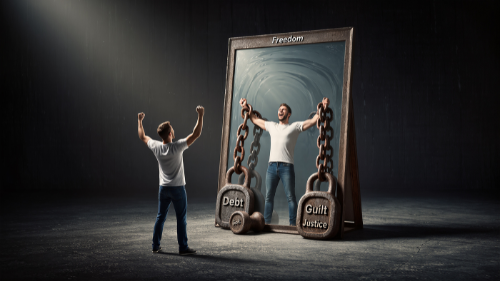How to Free Yourself from the Emotional Guilt That Keeps You Stuck
There’s a kind of guilt that won’t let you sleep—the one that follows
you even after you’ve apologized. It’s that thought that appears without
warning and says: “You could have done better,” “You shouldn’t have said that,”
“If you had acted differently, none of this would have happened.”
Emotional guilt is one of the heaviest burdens a person can carry because it
hurts and paralyzes. It makes you doubt yourself, drains your energy, and chains
you to the past. But no matter how real it feels, not all guilt makes sense—and
learning to free yourself from it is the first step to finding peace again.
When Guilt Doesn’t Correct but Punishes
Feeling guilty isn’t always bad—it’s an emotion that shows you care, that you
have awareness and empathy. The problem begins when emotional guilt stays
longer than it should and turns into a permanent punishment.
Some people carry guilt for things they can no longer change—for decisions they
made with the knowledge they had at the time, or for finally prioritizing
themselves after years of pleasing others.
In therapy, we often hear phrases like: “I wasn’t a good son,” “I didn’t do
enough,” “I let go of someone who needed me.”
Behind those words lies pain—and a lack of self-forgiveness. Guilt feeds on
rigid thoughts: believing you should have been perfect, that you weren’t
allowed to make mistakes.
The truth is, we all fail. We all make decisions that, in hindsight, we would
handle differently. But guilt doesn’t change the past—it only stops you from
living in the present.
How to Start Letting Go of Guilt and Regain Your Peace
Free yourself from emotional guilt by acknowledging what you feel without
judging yourself. Ask: “Am I learning from this, or just punishing myself?”
If guilt no longer teaches you anything new, it has already served its
purpose—you can let it go.
Speak about what weighs on you. When you keep it inside, it grows; when you
name it, it loses power. You can write a letter, talk about it in therapy, or
say it out loud—putting guilt into words is the beginning of liberation.
Then, practice self-forgiveness—not the empty kind, but the one that comes from
understanding your limits, fears, and circumstances. You did the best you could
with what you knew at the time.
And if today you’d do it differently, that’s not a reason for guilt—it’s a sign
of growth.



